
OneRBHS:
Year 2 Progress Report
Embracing Change, Driving Growth
In the second year of the OneRBHS: The Way Forward Strategic Plan 2022-2027, Rutgers Health navigated pivotal transitions, strategically positioning itself for growth as a leading academic health center. Through meticulous planning and execution, we laid the essential groundwork for a future defined by innovation, collaboration, and unparalleled excellence in research, education, and health care. Below we highlight 12 accomplishments and then follow with accomplishments that link with objectives to specific goals.
A New Identity
After a decade of exceptional achievements, Rutgers Biomedical and Health Sciences (RBHS) announced that it will be known as Rutgers Health. This significant milestone in our evolution reflects our continued commitment to excellence and answers our strategic plan’s call to adopt a single, unique identity that unites Rutgers Health. Following the announcement, we began a new marketing campaign to promote our identity as New Jersey’s only academic health center.
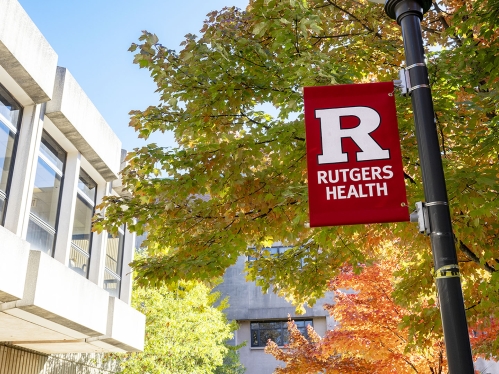
Celebrating a Decade of Excellence
2023 marked the 10th anniversary of our founding. We commemorated this landmark by acknowledging our past accomplishments and looking toward our future.
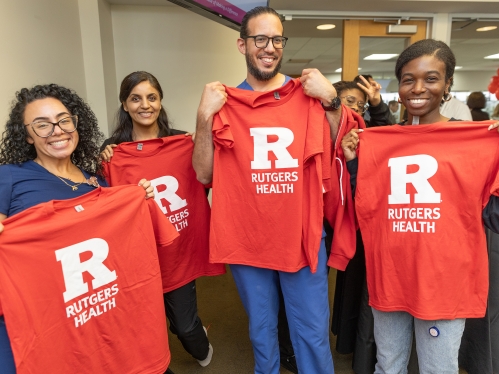
Forging a Stronger Future
To create a more robust medical education program that is well-equipped to meet the challenges of the future, the Rutgers University Board of Governors voted on July 10, 2023 to seek combined accreditation between New Jersey Medical School and Robert Wood Johnson Medical School. The integration of the medical schools will create co-equal bodies under a single accreditation to be known as Rutgers School of Medicine.

Building New Spaces
Progress continued to be made on the new Rutgers Health building at the HELIX site in New Brunswick. The Rutgers Health building at the HELIX will be the new home of Robert Wood Johnson Medical School and a Rutgers translational research facility with state-of-the-art labs to advance the work of 80 research teams. The building is designed as an innovation center providing businesses, universities, and researchers critical space to work, learn, experiment, and collaborate.

Transforming the Newark Campus
Plans began to fully upgrade and modernize the Medical Science Building in Newark, the hub of the New Jersey Medical School campus. The projected $600M project will transform the Rutgers Health Newark Campus, providing the platform we need to remain a destination for the highest-caliber students, faculty, and staff.
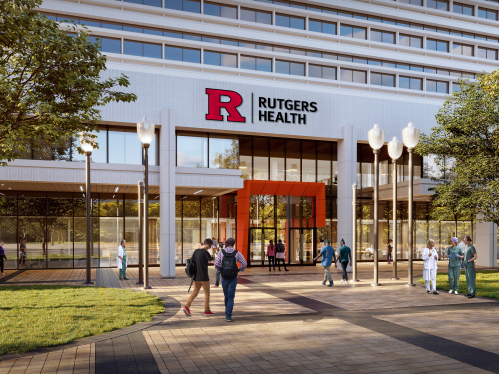
Advancing Clinical and Translational Science
NJ ACTS, the New Jersey Alliance for Clinical and Translational Science grant, has been successfully renewed for seven years, marking a pivotal milestone in advancing healthcare in the state. Led by Rutgers Health, this consortium unites leading academic institutions, health care providers, and community stakeholders in a shared mission to drive innovation and improve patient outcomes.
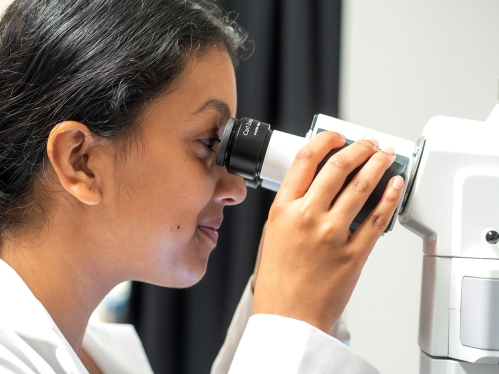






Year 2 of the strategic plan implementation was a transformative period for Rutgers Health. From celebrating a decade of achievements to launching a more identifiable new brand, we are well on our way to achieving the aspirational goals and objectives of OneRBHS: The Way Forward. Rutgers Health is well-positioned to deliver our collective vision of being a national model for academic health systems.
Joseph Barone and Shawna Hudson
OneRBHS Strategic Plan IMAT Co-chairs
Addressing Health Equity
Rutgers Health hosted its 10-year anniversary symposium, “Uncovering Solutions to Health Inequities,” in March. Faculty, staff, learners, and hospital partners explored solutions to health inequity that facilitate equitable health care outcomes and discussed how Rutgers can contribute to making the world well.
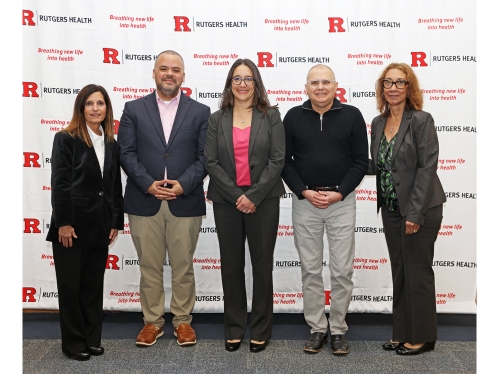
Promoting Diversity, Equity, and Inclusion
Rutgers Health is committed to diversity, equity, and inclusion (DEI) and is actively engaged in a process of institutional transformation to create a culture of belonging for all. More than just words, our institutional commitment to DEI promotes transparency and accountability for progress.

Learning Through Service
Rutgers Health launched the Rutgers Health Service Corps (RHSC), a new initiative connecting students with impactful service-learning opportunities across various health care and community settings. The goal of the program is to mobilize our Rutgers community to improve health outcomes, advance public service, reduce health disparities, and promote wellness in New Jersey.

Empowering Tomorrow's Workforce
Rutgers Health launched the Learning Health System Embedded Scientist Training and Research (LHS E-STaR) Center, which will train future scientists and health professionals to evaluate and improve the quality, outcomes, and patient-centeredness of care through educational classes, mentoring, and hands-on learning.

Sparking New Discoveries
The Rutgers Health grant portfolio had an increase in sponsored research and program awards of 150% over the past decade, from $218M in FY2014 to $549M in FY2023. Over the course of ten years, $3.7B in extramural funding has been provided to Rutgers and the State of New Jersey.

Unlocking Novel Insights
Rutgers Health rolled out the Rutgers Clinical and Research Data Warehouse, a secure, HIPAA-compliant central repository that includes diverse health care data and essential analytical tools for gaining a new perspective on medical conditions, outcomes, and treatments. This invaluable resource for researchers, clinicians, and health care professionals provides access to aggregated and organized clinical data to generate potentially life-saving insights.







Amidst a period of transformative change, Rutgers Health stands as a beacon of innovation and progress. With strategic foresight and determination, we have navigated challenges and seized opportunities, achieving important goals that propel us toward a future defined by excellence and impact. Below is a summary of our strategic plan goal-specific accomplishments. Some of the listed accomplishments link to more than one goal but are listed once with one selected goal.
Progress on Mission-Based (“M”) Goals
Rutgers Health represents New Jersey’s only comprehensive academic health care system, and includes world-class faculty, staff, students, and other trainees across the full spectrum of educational and training opportunities, research, and health care delivery. We've elevated the standards of clinical quality, empowered the next generation of health care leaders, advanced cutting-edge research, and deepened our commitment to serving and strengthening our communities.
-
Actualizing interprofessional synergies to improve clinical care and the patient experience

The objective of this goal is to leverage the comprehensive and unique aspects of Rutgers Health, coupled with the unique affiliations with RWJBarnabas Health, University Hospital in Newark, and the VA New Jersey Health Care System, to lead by improving the health of our communities through the delivery of the highest quality of, and access to, integrated and interprofessional clinical care and preventive health.
- Jeffrey DiGiovanni, a communications sciences and disorders scholar with extensive higher education experience, was named dean of the School of Health Professions for Rutgers Health. DiGiovanni will oversee the school’s undergraduate and graduate programs to prepare students for successful careers in health care and lead a health professions school that has surged in the national rankings and research growth.
- An electronic health record (EHR)-based early warning system was implemented to identify patients at risk of clinical deterioration throughout the entire health system. Through the hospitalwide mortality review process, Robert Wood Johnson University Hospital–New Brunswick quality leadership identified delays in recognition of clinical deterioration as a significant contributor to preventable mortality.
- Rutgers Cancer Institute of New Jersey has received its five-year competitive renewal as the state’s only Comprehensive Cancer Center designation from the National Institutes of Health (NIH)’s National Cancer Institute (NCI). This distinction, in collaboration with RWJBarnabas Health, translates into the best possible care for patients, where patients have access to innovative clinical research, exceptional patient care, and advanced technology.
- The Herbert and Jacqueline Krieger Klein Alzheimer’s and Dementia Clinical Research and Treatment Center, led by Michal Schnaider Beeri, is at the core of the university’s academic health system. The center will offer research expertise from the institute, Robert Wood Johnson Medical School, New Jersey Medical School, and the Rutgers Institute for Health, Health Care Policy and Aging Research, as well as facilitate clinical research in Alzheimer’s disease that could result in new medical treatments.
- Robert E. Gross, a renowned neurosurgeon who has led collaborative teams of clinician-scientists in the pursuit of improving the quality of life for patients with neurological and psychiatric disorders, has been appointed joint chair of the Department of Neurosurgery at Robert Wood Johnson Medical School and New Jersey Medical School.
- The Rutgers Health and RWJBarnabas Health Proof of Concept Incubator (PoCI) is a core group focused on identifying and supporting ideas that center around improvements in health care delivery. The goal is to accelerate the process using rapid-cycle process improvement, and rapidly trial novel methodologic and technologic solutions to overcome patient-facing clinical health care challenges in a timely, cost-effective, and systematic way.
- Rutgers is researching a new health care model that emphasizes primary care and prevention over emergency care in underserved communities. Funded by NIH grants totaling more than $1M through a recent two-year award from the New Jersey Alliance for Clinical and Translational Science (NJ ACTS), a Rutgers hub of the National Center for Advancing Translational Sciences, Dr. Gregory Peck is on average one of just two critical care surgeons funded nationally annually, creating new models of health for NIH consideration.
- To address health inequities, Rutgers University Behavioral Health Care, the RWJBarnabas Health network and the nonprofit organization Woods Services are establishing the first integrated primary and behavioral health care center for people with intellectual and developmental disabilities and autism in New Jersey, aiming to improve health outcomes and reduce the overall costs of care for an underserved population.
- The Rutgers Health adult primary care practices in Family Medicine and General Internal Medicine, working in conjunction with the Rutgers Office of Population Health and RWJBarnabas Health System Population Health team, made strides in improving their performance on multiple metrics in our value-based care contracts, including breast, colorectal and cervical cancer screening, diabetes care management, and annual preventive visits. This contributed to the overall medical group and health system doing well on their collective value-based care contracts with public and private payors.
-
Educating, training, and preparing a diverse New Jersey biomedical and health sciences workforce

The objectives of this goal focus on fostering excellence in the delivery of health professions and biomedical sciences education by leveraging the strengths of our interprofessional community of educators across Rutgers Health to recruit, train, support, and prepare a diverse and highly competitive New Jersey biomedical and health sciences workforce. The objectives also highlight the need to enhance the Rutgers Health-wide teaching and learning infrastructure and elevate the recognition of educators and educational administration.
- Rutgers Health developed learning goals about DEI and social justice for incorporation in existing curriculum by offering inclusive courses, curricula, and learning opportunities across Rutgers Health (e.g., cultural humility, antiracism goals to map competencies).
- The Rutgers School of Nursing is one of 10 colleges and schools of nursing in the nation to be recognized for its commitment to diversity, equity, and inclusion (DEI) and one of two New Jersey academic institutions to receive the 2023 Health Professions Higher Education Excellence in Diversity (HEED) Award from INSIGHT Into Diversity magazine. Rutgers School of Nursing is ranked among the nation’s top 5 percent for BSN programs and sixth highest in the nation by U.S. News & World Report.
- The Perry N. Halkitis Endowed Chair in LGBTQ+ Public Health at the School of Public Health has been established and unanimously approved by the Rutgers University Board of Governors. This Chair supports education and scholarly work to ensure a lasting foundation for a science-based, human rights approach to LGBTQ+ health and well-being.
- Kyle Warren was appointed as Assistant Vice Chancellor for Student Affairs responsible for proposing and developing Rutgers Health-wide initiatives and support services for students.
- In 2024, the Rutgers Rising Star Scholars program recognized 26 medical school students who demonstrated excellence across the Rutgers Health mission areas, including academic achievement, excellence in discovery, innovation and entrepreneurship, and commitment to our community. Rising Star scholars are students of Robert Wood Johnson Medical School or New Jersey Medical School.
- The School for Graduate Studies–Biomedical and Health Sciences developed a Training Grant Support Office as a dedicated resource to the Rutgers Health faculty providing support for NIH-supported training grants including both pre-award (preparation and grant submission) and post-award administration of the training program. These training grants provide key support for our pre- and post-doctoral learners.
- Rutgers Health federal training and individual fellowship awards have increased every year since federal FY2018, and has increased by $1.6 million in federal FY2023.
- Through interactive stakeholder meetings, the Rutgers Health Provosts created a rubric to help non-tenure track faculty understand the evaluation criteria for promotion in the Teaching, Clinical Educator (CE), Professional Practice (PP), and for Clinically Focused University Practitioners (CFUP) and Voluntary Clinical Faculty (VCF) tracks. Additional information will be forthcoming for non-tenure track faculty in other tracks (e.g., Clinical Scholars and Research Tracks).
-
Building on Rutgers Health strengths and opportunities to excel in discovery and innovation

The objectives of this goal focus on building on the existing strengths of established and emerging strategic research areas, identifying and cultivating new areas of impactful and innovative research, and growing our research portfolio and presence to be leaders among our peer institutions. An important Rutgers Health advantage is its affiliations with RWJBarnabas Health, University Hospital in Newark, and the VA New Jersey Health Care System, which provide access to patients for translational and clinical research, and proximity to New Jersey’s extensive bio¬technology and pharmaceutical companies. A robust Rutgers Health research enterprise will improve health in New Jersey, address health-related social inequities, and provide an engine for discovery, innovation, and economic development.
- A Rutgers Health Ideation Workshop and support website were carried out to help our investigators build research teams to develop at least 12 new bold and imaginative approaches that seeks federal research funding to solve critical health challenges supported by the federal new Advanced Research Projects Agency for Health (ARPA-H) initiative.
- The Rutgers Regional Biocontainment Lab at New Jersey Medical School—one of 12 Regional Biocontainment Laboratories (RBLs) nationwide—was renovated and expanded via support by an NIH grant to be a state-of-the-art magnet for academic and public-private research projects to understand and combat hazardous pathogens, such as tuberculosis and SARS-CoV-2, and increase discoveries related to highly infectious agents.
- A multidisciplinary group of researchers at Rutgers Health received a $3.1M grant from the (NIH) to study the impact of environmental influences on pregnancy and children’s health as part of the NIH’s Environmental influences on Child Health Outcomes (ECHO) Program.
- IntelliGenes, a first-of-its-kind software created at Rutgers Health by a team led by Zeeshan Ahmed, combines artificial intelligence (AI) and machine-learning approaches to measure the significance of specific genomic biomarkers to help predict diseases in individuals.
- The New Jersey Center for Advancing Technology and Cardiovascular Health (NJ CATCH) program, spearheaded by Partho Sengupta and Naveena Yanamala, was established to revolutionize cardiovascular care by fostering collaborative networks with academic institutions, health systems, and industry leaders to drive advancements in digital translational medicine.
- Two Rutgers Health professors, Fred Russell Kramer (New Jersey Medical School) and Patrick Sinko (Ernest Mario School of Pharmacy) were named 2023 fellows of the National Academy of Inventors, an honor recognizing individuals for their contributions to major advancements in science and consumer technologies.
- The Rutgers Health grant portfolio increased two-and-a-half fold over the past decade, from $218M in FY2014 to $549M in FY2023. Notably, $3.7B in extramural funding has been provided during the past ten years to Rutgers and the State of New Jersey.
- Rutgers Health rolled out the Rutgers Clinical and Research Data Warehouse, a secure, HIPAA-compliant central repository that includes diverse health care data and essential analytical tools for gaining a new perspective on medical conditions, outcomes, and treatments. This provides our research faculty and trainees a powerful tool to carry out clinical research that advances patient care and discoveries.
-
Engaging meaningfully with local and global communities

The objectives of this goal ensure that, as a public institution, we are engaged with our local and global communities to advance research, education, and clinical care through service that addresses relevant community health challenges and needs. By engaging with these communities in ongoing collaborations, we can work together to improve and sustain health. Another important aspect of community engagement is to expose students and trainees to learning opportunities that expand consciousness of their impact on the communities they serve and increase awareness of the cultural and societal factors that affect health.
- A Community Advisory Board was created in support of the Population Health Cohort Study at the Institute for Health, Health Care Policy and Aging Research's Center for State Health Policy, which is designed to generate practical, actionable knowledge for improving health and well-being for people in New Jersey and across the nation.
- The new “R-Community” electronic platform helps transform the way we coordinate, track, and promote community service participation across all Rutgers campuses and showcases the profound impact our faculty, staff, students, and learners have on the health and well-being of all the communities we serve.
- A comprehensive student-engaged HPV Vaccination Campaign was launched by Student Health Services in March of 2023 to advance awareness of human papillomavirus vaccination and vaccination rates among students as collaborative between Rutgers and community-based partners.
- In March 2024, a Public Health and Healthcare Workforce Roundtable, co-chaired by Inaugural Chancellor Brian Strom and Commissioner Kaitlyn Baston, was held between Rutgers Health and the New Jersey Department of Health to identify areas of alignment and opportunities to address the state’s health care workforce challenges. Future collaborations are planned as a follow up to this meeting.
- The Rutgers Health Service Corps High School Summer Program launched in July 2023 its inaugural high school summer pathway program, named PHOENIX (Population Health Outreach and Education for Next generation Impact and eXcellence), with the aim of introducing high school students to the health professions, population health, and community service.
- As a part of their recently launched Career Exploration Program for seniors, Rutgers Health hosted 46 students from North Star Academy Washington Park High School in Newark for a campus tour and educational session with staff and students from New Jersey Medical School, School of Health Professions, School of Dental Medicine, and School of Nursing to learn about the tangible steps required after high school to pursue careers in health-related fields.
- In April 2024, New Jersey Medical School hosted its inaugural Community Health Symposium. The theme for the symposium was “A Celebration of Service Learning and Partnerships for Better Health.” The event welcomed all local stakeholders to the Newark Campus to learn about the impact of the medical school and its students in the local community.
Progress on Unifying Theme (“U”) Goals
Through focused efforts, we've fostered a supportive environment for our workforce; cultivated an inclusive culture; embraced collaborative, team-based approaches; optimized our systems and structures; and strengthened our connections within the organization.
-
Growing and supporting an exceptional, compassionate, and diverse workforce

Our people are at the heart of a successful OneRBHS. The objectives of this goal are focused on developing, supporting, and promoting our workforce, including our students and trainees who represent our future. The growth and evolution of the Rutgers Health community is centered on a commitment to principles of diversity, equity, and inclusion, and Rutgers Health core values.
- Between April 1, 2023 and March 31, 2024, Rutgers Health schools, centers, and institutes recruited 122 faculty across all tracks and ranks.
- The 2023 Chancellor Awards celebrated the accomplishments of 42 faculty and staff during an October 2023 ceremony. The awardees were nominated and acknowledged for their contributions in clinical care; community service; diversity, equity, and inclusion; education and mentorship; research and innovation; and staff leadership, service, and support in addition to recognizing lifetime achievement for both faculty and staff.
- An inventory of pathway programs across Rutgers Health were created and a series of meetings with program administrators for each school were convened to learn about their respective programs and conduct a survey of students to ascertain their perspectives on the programs.
- The Rutgers Health Pathway Programs in the Health Professions was launched through the purview of the Population Health Consortium in November 2023 to include Centers and Institutes and concentrate on opportunities for collaboration specifically focused on high school students. This group also includes participation by the NJDOH.
- Dedicated funds were allocated to support the Accelerated Recruitment of individual faculty, cluster hires, and mini-sabbaticals as part of the Rutgers Presidential Diversity Initiative to advance our overarching institutional goals for creating systemic universitywide change.
- The development of postdoc and resident-to-faculty transition programs for those from historically underrepresented backgrounds and groups in health professions were explored, and five Presidential Postdoctoral Fellows and one clinical resident, who identify as being from underrepresented groups, were successfully recruited to Rutgers Health as a potential path to transition into faculty roles in their departments upon completion of their training.
- Janet Alder, associate professor in the Department of Neuroscience and Cell Biology at Robert Wood Johnson Medical School and assistant dean for Graduate Academic and Student Affairs in the School for Graduate Studies, was appointed as assistant vice chancellor for Postdoctoral Affairs to recruit and support the career development of postdoctoral trainees in the biomedical sciences.
- A new Rutgers Health webpage now serves as a recruiting tool for prospective postdocs and a central repository for resources and upcoming activities for current postdocs including fellowship application materials and upcoming professional development programs.
- Alexis Fulks was appointed as assistant vice chancellor for Faculty Affairs to support faculty appointments, promotions, and reappointments.
- Humberto Jimenez, assistant professor at Ernest Mario School of Pharmacy, was appointed as a director of Diverse Faculty Engagement and Advancement to provide outreach and support for early-career diverse faculty.
- Joseph Barone, dean of the Ernest Mario School of Pharmacy, was awarded the Lifetime Achievement Award from the New Jersey Pharmacists Association for his dedication to the field of pharmacy for more than 40 years.
- Rutgers Health marked the 10th anniversary of its founding with events in Piscataway and Newark that celebrated the tremendous faculty, staff, and trainee accomplishments and looked toward its future.
-
Fostering a culture of respect that prioritizes inclusion and accountability

This unifying theme focuses on developing the ideal Rutgers Health workplace that fosters a positive environment to nurture, empower, and support the Rutgers Health community to achieve excellence. The objectives of this goal aim to recognize and celebrate our different qualities and experiences, and promote a climate of inclusion, respect, and belonging for all in the spirit of forming a "beloved community." Additionally, personal, leadership, and institutional collective accountability are paramount to successfully achieving this goal.
- Each Rutgers Health school, major center, and institute has an implemented diversity, equity, and inclusion (DEI) plan with success metrics that have been identified, measured, analyzed, and reported.
- Each Rutgers Health School has added DEI contributions/activities to the performance evaluations of all academic leaders in their school. DEI goals have also been incorporated into annual performance metrics for Rutgers Health leadership and unit-level administrators.
- Rutgers Health held an annual all-day in-person leadership retreat in October 2023, which included the chancellor’s cabinet of deans, directors, and senior leadership, where they took a deep dive around topics such as antiracism, microaggressions, and the importance of diversity, equity, and inclusion, which included discussion and conversation around promising paths toward profound and sustainable progress here.
- In support of the well-being-related initiatives at Rutgers Health, an all-day, in-person leadership retreat was held in January 2024. Dubbed “Transformation Through Psychological Safety,” the event focused on creating high levels of psychological safety with others in the organization as leaders drive significant change initiatives.
- Rutgers Health assessed and monitored improvement in climate survey scores across all schools and for each school.
-
Emphasizing team-based and collaborative approaches across all mission areas

A unique aspect of Rutgers Health is its comprehensive constellation of health professions schools (dentistry, health professions, medicine, nursing, pharmacy, and public health) and affiliations with the major statewide health system— RWJBarnabas Health, the state’s only public tertiary care hospital—University Hospital in Newark, and the VA New Jersey Health Care System. These affiliations afford significant opportunities for Rutgers Health to contribute, excel, and lead in team-based and collaborative approaches to interprofessional education, clinical care, research, and community engagement.
- The first annual Rutgers Health Interprofessional Preceptor Appreciation Event (IPE) was held in January 2024 to celebrate the innovative work being done across professions, practice sites, and schools to care for the individuals, families, and communities of New Jersey, individually and collectively.
- The Parker Health Group Division of Geriatrics was created in Robert Wood Johnson Medical School’s Department of Family Medicine and Community Health, which will focus on improving care for seniors through applied research, education, and interdisciplinary collaboration.
- In Fall 2023, the inaugural Rutgers Health Hack, with a total of 151 participants from 18 countries and eight U.S. states, came together to form 16 interdisciplinary teams collaborating to develop innovative health care solutions in the areas of digital health, patient engagement, population health/health equity, and home hospitalization.
- Chancellor Awards for exceptional contributions of high-performing teams to carry out work in at least one of the Rutgers Health mission areas were awarded to the New Jersey Medical School Research With A Heart Team and the Rutgers School of Dental Medicine Holocaust Survivor Program.
- A diverse group of Rutgers Health academic leaders have collaborated to amplify a collective voice around interprofessional advocacy issues working with state legislators, congressional leaders, and the governor’s office on various issues aimed at improving the ability to train and retain an interprofessional health care workforce in New Jersey.
- Rutgers School of Nursing will lead the research, education, and training component of a new $75M state initiative to improve maternal and infant care. Rutgers will lead a consortium of state and community colleges that will collaborate with Capital Health and Trenton Health to launch the Maternal and Infant Health Innovation Center aimed at eliminating disparities and advancing maternal health equity in Trenton and across New Jersey.
- Rutgers Health launched the Learning Health System Embedded Scientist Training and Research (LHS E-STaR) Center, which will train future scientists and health professionals to evaluate and improve the quality, outcomes, and patient-centeredness of care through educational classes, mentoring, and hands-on learning.
- The Interprofessional Education Collaborative (IPEC) issued an updated version of the core competencies we have used since 2013. The Interprofessional Education Faculty Advisory Council is reviewing the new subcompetencies to assess how well we are currently meeting them and where we need to develop new curriculum to meet others.
- A module on TeamSTEPPS® (Team Strategies and Tools to Enhance Performance and Patient Safety), an evidence-based set of tools and training curriculum, has been added to the homepage for the Office of Interprofessional Programs that will allow all schools and programs to provide the introductory training.
- The School of Health Professions has developed an Interprofessional Education (IPE) game and training including videos, reading materials, interactive exercises, and quizzes for six modules on: IPEC Core Competencies, Introduction to TeamSTEPPS and Team Structure, Team Communication, Team Leadership, Situation Monitoring, and Mutual Support.
- Dr. Christine Arenson, the director of the National Center for Interprofessional Practice and Education (IPEC), presented during February 2024 at the first annual Interprofessional Grand Rounds.
-
Increasing the effectiveness of enabling systems, structures, and processes

There are several enabling systems and administrative structures that need to be enhanced for Rutgers Health to fulfill its mission and succeed in implementing its strategic goals. The following objectives focus on infrastructure needs and administrative functions, ensuring efficient systems, structures, and processes, and improving knowledge and information management.
- Rutgers Health is participating in the Rutgers Human Capital Management (HCM) Transformation Initiative that aims to combine human resources and payroll into a single system, aligning and redesigning business processes for increased efficiency and consistency, and ultimately implementing the Oracle HCM cloud-based software solution which will further transform how we work at Rutgers.
- Erin Bauzyk was appointed Associate Vice President for Health Sciences IT, responsible for providing IT leadership, vision, assessment, planning, and strategic management to Rutgers Health and the university to promote opportunities for emerging technologies and to support and enhance services for students, faculty, clinicians, researchers, and staff.
- A new performance management software platform was implemented, in collaboration with Rutgers Cancer Institute of New Jersey, to track and monitor outcomes and impacts of the Rutgers Health strategic plan.
- Progress continued to be made on the new Rutgers Health building at the HELIX site in New Brunswick that will be the new home of Robert Wood Johnson Medical School with exciting new research to house up to 80 investigators.
- A $600M project was approved to upgrade and modernize the NJMS Medical Science Building that will transform the Rutgers Health Newark Campus.
-
Developing and promoting a shared OneRBHS identity

Rutgers Health is a relatively new branded entity, including our clinical affiliations with RWJBarnabas Health and University Hospital. This presents an opportunity for Rutgers Health to address identity challenges, grow reputation, and promote philanthropic collaborations and gifts. The adoption of a singular, unique identity to unite the Rutgers health affairs mission is critical to the long-term success of the institution as we build New Jersey’s premier academic health center into a nationally renowned system.
- After a decade of exceptional achievements, Rutgers Biomedical and Health Sciences (RBHS) announced a single, unique identity to unite “Rutgers Health” and began a new marketing campaign to promote our identity as New Jersey’s only academic health center.
- A multimedia marketing communications campaign strategy was developed to further boost the accomplishments and leverage the comprehensive and unique aspects of Rutgers Health and Rutgers University and their hospital affiliations. Our health-related academic, research, and service missions were positioned in a way that conveys our contributions to the state of New Jersey and beyond, elevates our reputation, and unites us with a shared purpose and mission.
- In March 2024, members of the Rutgers Health community joined experts in health equity and disparities for the 10th anniversary symposium, “Uncovering Solutions to Health Inequities,” exploring solutions that facilitate equitable health care outcomes and how Rutgers can contribute to making the world well.
- R-Comm developed and launched in 2023 a quarterly Rutgers Health newsletter highlighting excellence and achievements across the mission areas. To date, 4 quarterly issues have been circulated to the Rutgers Health community, alumni, and friends.
- Phase 2 of the Rutgers Health brand campaign launched to include the RWJBarnabas Health partnership to co-brand, once permission is granted, as part of a public-private partnership between Rutgers University and RWJBarnabas Health, forming the largest academic health system in the state and one of the most comprehensive in the country.
- Innovative fundraising programs such as the Rutgers University newly established legacy professorships engaged new constituents and philanthropy:
- Rutgers Health senior vice chancellor Bishr Omary has endowed the university’s inaugural legacy professorship. The Rutgers University Board of Governors has unanimously approved The Bishr and Souha Omary Family Legacy Professorship.
- Rutgers School of Public Health professor emeritus George G. Rhoads endowed a legacy professorship bearing his name that has been unanimously approved by the Rutgers University Board of Governors.
- The Marlene and Barry Brandt Behavioral Health Treatment Center and Residence, the newest part of the Rutgers Behavioral Health System, will transform youth and young adult mental health care in New Jersey and serve as a model for care nationwide. The center was endowed by a generous gift from Rutgers alumna Marlene Brandt who committed $30M to help launch the Rutgers Initiative for Youth Behavioral Health and Well-Being.
- The new Jack and Sheryl Morris Cancer Center at Rutgers Cancer Institute represents a $750M investment and will be the first of its kind in New Jersey: a state-of-the-art, freestanding cancer hospital featuring outpatient and inpatient capacity coupled with research laboratories, retail space, and ancillary services devoted to patient wellness.
- Parker Health Group gave $18.8M to establish the Parker Health Group Division of Geriatrics in the Department of Family and Community Medicine at Robert Wood Johnson Medical School
- A $3M gift from James F. Dougherty, a Rutgers alumnus and Board of Governors member, creates an endowed chair in LGBTQ+ Public Health named for the Rutgers School of Public Health Dean Perry N. Halkitis.
- Rutgers Foundation conducted "Clinician Engagement in Philanthropy" workshops for behavioral health clinicians in conjunction with RWJBarnabas Health, and forthcoming workshops are planned for both schools of medicine jointly later this year.
Strategic Plan Updates
Revisit the Strategic Plan, review our progress so far, and meet the committees working toward our goal of OneRBHS.
